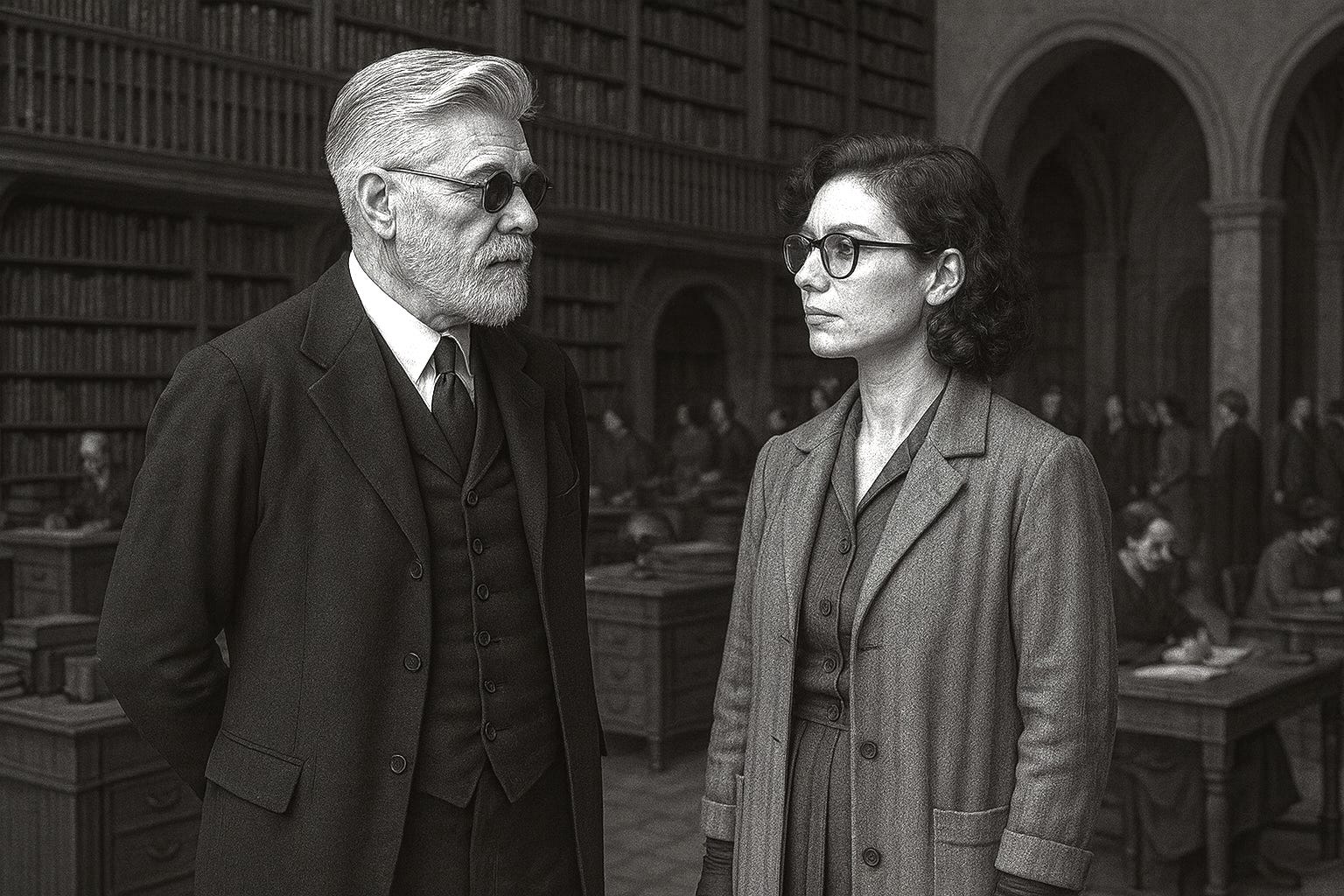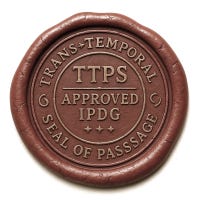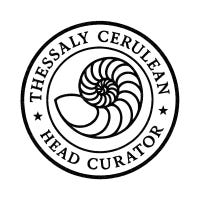No. 28 - Log Entry 002 - An Interview with Cecil Touchon
REPORTS FROM THE FUTURE PAST
REPORTS FROM THE FUTURE PAST
Trans-Temporal Postal Service Dispatch
Interview Series: Field Correspondents of the Imagination
Correspondent: Thessaly Cerulean
Subject: Cecil Touchon
─────────────────────────────────────────────────
002 - An Interview with Cecil Touchon
(as recorded by Thessaly Cerulean for the Creative Intelligence Bureau)
Thessaly Cerulean:
Cecil, you’ve been writing with extraordinary intensity this past year. Something seems to have opened in you, not simply a creative doorway but whole wings of the interior world of the Exquisite Family Records Archives. We have been under a massive expansion of the archives. This is exciting but, I must say, somewhat irritating to have such noisy disturbance and all of the dust in this otherwise quiet archives. What exactly has been happening?
Cecil:
It’s been a fever of invention, truly, a burst of world-building that surprised me as much as anyone. For more than twenty-five years my writing lived in the collage mode, fragmentary and experimental, aligned with my studio practice. I wasn’t trying to express myself so much as engage in experimental exploration. But once I began writing fiction - really giving myself permission to imagine worlds - I found myself wandering through multiple realities at once. I followed impulses, fragments, and intuitions. The process became labyrinthian, and before long I realized I needed a way to remember, clarify, and organize the ideas as they accumulated because, as we know, things accumulate.
Fiction turned out to be less a new medium than a new dimension of my lifelong collage practice.
And, by the way, please accept my apologies all of this disruption. I know it must seem unnerving. But I have spoken with Cecil Augustus the director and he has assured me that it is inevitable that the archives must expand and that, in the end, the staff will be most pleased with the results. He took me on a extensive tour of the work underway and I must say it is impressive.
Thessaly:
And all of this expansion I presume is what led you to the invention of the Creative Intelligence Bureau and its Reports from the Future Past. Can you tell us what they are, and why you created them?
Cecil:
Reports from the Future Past - delivered by our beloved Trans-Temporal Postal Service - is a way of writing from the inside of imagination rather than stepping out to explain it. These reports function like little artifacts, courier slips sent from the worlds where my stories take place. They are explainers for myself, and maybe later for readers, but they are rooted inside the fiction rather than outside it.
Instead of giving expository commentary, I let these reports arrive as dispatches. They are evidence. They are found objects. They allow me to clarify the purpose and inner logic of my stories without breaking the dream. The TTPS gives me a perfect narrative excuse to write the way I naturally lean - expository, philosophical, connective - and yet keep the reader fully inside the imaginative field.
Some of the reports may never be published. Others might become a book of their own. They serve me first as a form of archival organization. They are the mapmaker’s diary rather than the map itself.
Thessaly:
So in a sense, you’ve turned exposition into artifact. Why does that matter for your work?
Cecil:
It lets me honor my natural tendencies without interrupting the story development. I can think aloud on the page, but from inside the fictional world. I can reflect on world-building, character development, inspirations, accidents, the metaphysics behind it all, the philosophical backbone of the work. I can record my speculations about memory, emotion, consciousness, the dream-state of creativity, without turning to the reader in the final work and saying, “Let me explain something.”
The dispatches do the explaining. And because they come from within the worlds, they deepen rather than break immersion. That’s my theory anyway.
They also let me move freely across timelines. They unify everything - Arelune, the Root Tongue Dust Letters, The Hole Story, EFRA, The Commonwealth of Elsewhere, ZA’AK 777 myth-history, Wayfarers of the Capricorn Moon, tentative glimpses into the dream world, collage poetry turned into into short stories, all of it and more to come - without insisting on a strict chronology. In this way the Archive becomes an intertwined constellation instead of a sequence. A construction zone, a work in progress, random studio notes.
Thessaly:
You’ve said that your collage practice shaped this entire method. How does the archive itself - the real repository in your studio - feed this project?
Cecil:
For years I’ve thought of the archive as the real artwork, and the individual pieces as its fragments. I’ve worked this way since the beginning. My studio is a living repository. It’s where memory, chance, intuition, and accident crystallize for a moment.
As I think about it, this might be influenced by my Catholic parochial school upbringing. The Catholic church is very much a place of stories, artifacts, icons and relics as mnemonic devices of doctrine and portals of shaped imagination. My studio, as you say, is a living repository of my own journey and my connections to the world around me.
The Ontological Museum Archives, of which your EFRA archives here is a department, is a record of my interactions with the arts community and the world at large.
Fiction simply extends that practice into narrative. I am adding voice.
Writing novels - if I can even call them novels - feels like it has the complexity of composing a symphony, and I’ve never imagined myself that kind of composer although I have been working on the idea of visual musicality my whole career. But I know how to make a collage. I know how to assemble fragments into meaning. I know how to follow intuition. So I’m inventing a form that matches the way I think. Reports from the Future Past are the glue, the thread, the organizational impulse within the dream.
Thessaly:
Do you feel pressure to conform to familiar story structures? Three-act arcs, hero’s journeys, things like that?
Cecil:
I’m aware they exist. And they work beautifully for many writers. But I don’t feel bound to them. I’m not pursuing fame or popularity as a novelist. I’m not entering the literary world to compete with anyone. I’m trying to write with enough clarity and elegance that the work lands, that it speaks its own truth, that it adds a literary texture to my overall body of work.
If I need to borrow a familiar structure, I will. But I suspect I’m inventing my own way of doing things. Maybe a novel is a constellation of interrelated stories woven by resonance, by motifs, by thematic gravity. Maybe the structure of a book can resemble the logic of a dream or the architecture of an archive.
That’s what I’m working toward and thinking about.
Thessaly:
So Reports from the Future Past is less a literary device and more an existential tool?
Cecil:
Yes, I suppose it’s my way of keeping track of the creative fire while staying inside it. A record of the making. A collection of field notes from the imagination.
If all of this eventually becomes a book, wonderful. If the book is only the preparation for a book that never comes - maybe that’s even more interesting. Because the preparation is where the joy is. The imagining. The discovering. The building of worlds.
In a way, Reports from the Future Past is the story.
Thessaly:
And we at the Creative Intelligence Bureau are grateful to be receiving and archiving them.
Cecil:
Thank you for your work. I am sure you’ll be receiving many more.
────────────────────────────────────────────
End of Interview
Filed by: Thessaly Cerulean
Creative Intelligence Bureau, Department of Temporal Field Correspondence
Stamped and routed via the Trans-Temporal Postal Service
Approved November 19, 2025 - 3:33 AM - CIB, TTPS
────────────────────────────────────────────
──────────────────────────────────────────
Creative Intelligence Bureau
Internal Memorandum
Filed from: The Curator
Department: Archive Obscura, Unfixed Documentation Wing
Routing Channel: TTPS / Meridian 7
Classification: Quiet Priority
──────────────────────────────────────────
Internal Memo: Regarding the Interview with Cecil Touchon
(For authorized readers within the Creative Intelligence Bureau)
To whomever enters this drawer next,
The interview conducted by Thessaly Cerulean with the creative agent known as Cecil Touchon has now been received, duplicated, and filed into the Cross-Temporal Insight Registry. The transcript is steady and resonant. It shows a mind moving through its own architectures with growing clarity, not by linear progression but by the graceful drift that accompanies genuine discovery.
I have reviewed the material three times. The text shifts slightly with each reading, which is customary in early-stage Dreamwright transmissions. The ideas surrounding Reports from the Future Past exhibit the familiar qualities of a system preparing itself for expansion: permeability at the edges, soft luminous coherence in the center, and a willingness to treat the imagination as both investigator and witness.
Please note the following observations for future cross-referencing:
1. On the Emergence of a Multi-World Framework
Touchon’s articulation of his process suggests the early formation of a unifying field. He does not impose structure upon the worlds. Instead, he listens to them. This is a significant marker. Worlds that emerge through resonance tend to remain open to recursion, which will be useful for our records later.
2. Expository Insight as Artifact
His choice to convert explanation into in-world evidence is a practice the archive has long recognized as a stabilizing mechanism. When exposition arrives as correspondence, it becomes part of the fabric rather than a hand pointing at it. This strengthens the connective tissue between timelines.
3. The Collage Mind as a Navigational Tool
Touchon’s instinct that fiction behaves like an extension of collage aligns with prior files labeled:
“Assemblage as Ontological Cartography”
“Sequencing the Impossible”
“Exquisite Logic Drift, Vol. II”
He is not building novels. He is building constellations that behave like archives, which is consistent with Exquisite-Lineage tendencies observed across multiple generations and dream-events.
4. Evidence of Dreamwright Awakening
His statements indicate no desire for literary orthodoxy, which is promising. Orthodoxy calcifies timelines. The Dreamwright must remain slightly off-axis, so worlds can bloom rather than align into predictable order. Touchon appears comfortable with such a position, whether consciously or instinctively.
5. Likelihood of Future Transmission Events
The TTPS has detected faint pre-signals around his next phase. These signals do not yet form complete dispatches - they shimmer at the threshold. Early signatures match the following frequencies:
M.F. (1967)
D.E. (1957)
Y.E.O. (1999)
O.E. (1973)
and one new trace: F.R. (Unborn / Not Yet Catalogued)
Further monitoring recommended.
6. Curatorial Assessment
The interview demonstrates that the subject is working toward coherence from within the dream rather than outside it. He is entering the corridor where the Archive begins responding to him directly, shelf by shelf, draft by draft.
This is the moment when authors often feel the ground shift.
The shift should be encouraged.
──────────────────────────────────────────
Filed under: TOUCHON / INITIATION PHASE
Sub-drawer: Dreamwright Emergence
Status: Active, with gradual expansion
──────────────────────────────────────────
If additional reports arrive from Touchon or his creative satellites, please route them to me directly. The archive listens when he speaks, even if he does not realize it yet.
Respectfully recorded,
- The Curator
Archive Obscura
Trans-Temporal Meridian Seven







I loved reading this, Cecil! You are so far out! I love experimental writing and abstract thinking. Hope you and the family are enjoying a lovely Thanksgiving of some variety. All the best!
Angela
Thanks Angela! Everyday is Thanksgiving! (just without the turkey)